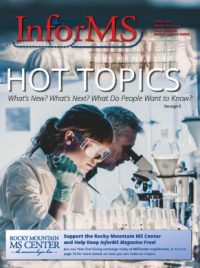NfL and GFAP as Measures of Disease Progression
Prospective study to evaluate Neurofilament Light (NfL) and glial fibrillary acidic protein (GFAP) as biomarkers for disease progression over time in patients with multiple sclerosis and other inflammatory neurological diseases. This study includes treatment of patients newly diagnosed with MS, neuromyelitis optica (NMO), neurosarcoidosis, or autoimmune encephalitis. Serum and plasma samples are drawn from newly diagnosed patients who have yet to start treatment. Additional plasma and serum samples will be collected after patients begin treatment, approximately every six months when patients return to clinic.
Over time, NfL and GFAP will be monitored to determine if these proteins can be used as reliable indicators of disease progression.
Identifying Potential MS Biomarkers
Ongoing cross-sectional exploratory study to identify potential biomarkers that represent injury to the three different key Central Nervous System (CNS) compartments including the neuronal compartment, astrocyte compartment, and oligodendrocyte compartment in patients with MS and related inflammatory CNS diseases. This study includes controls and patients diagnosed with multiple sclerosis, NMO, neurosarcoidosis, or autoimmune encephalitis who are seen by the neurology providers at UCH and have consented to be included in the RMMSC Biorepository. Patients will contribute paired CSF and blood samples collected at the time of a lumbar puncture, and stored in the RMMSC biorepository. These samples will be analyzed for biomarkers of interest, including GFAP (astrocytes); NfL (neuronal); Tau (neuronal); UCHL1 (neuronal); and MBP (oligodendrocyte). The resulting information will be used to develop future biomarker tests for clinical trials and clinical use.
RISE/DREAMS — Risk Factors in Early MS
The RISE/DREAMS research project is designed to create an MS risk profile to identify genes, biomarkers, or environmental circumstances that are associated with earliest manifestations of MS.
The RISE/DREAMS MS study is examining asymptomatic, first-degree relatives of MS patients between 10 and 30 years of age.
Using the data and biomarker analyses, we aim to identify risk factors to diagnose and treat MS as early as possible.
For more information on any of these studies, or other studies underway at the Rocky Mountain MS Center at University of Colorado, please contact NeuroResearch@CUAnschutz.edu or 303-724-4644. You can also find a link to all ongoing studies at MSCenter.org/research.






